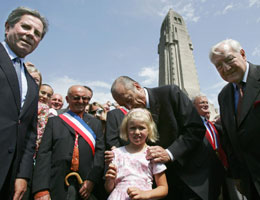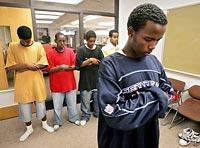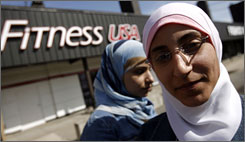
Muslims in America
They face rising public suspicion but new opportunities
By MARGOT PATTERSON
Being an American Muslim means facing mountains of bad publicity. It also means discovering growing numbers of companions for the journey.
The American Muslim population continues to grow, even as polls show that Muslims in the United States today are facing a rising tide of negative public opinion. A Washingon Post-ABC News poll, taken during the controversy over the Dubai ports deal, found that 46 percent of respondents reported negative views of Islam, seven points higher than polls taken in the aftermath of the Sept. 11, 2001, attacks on the World Trade Center and the Pentagon. A recent survey by the Council on American-Islamic Relations found that about a quarter of all Americans think “the Muslim religion teaches violence and hatred.” A CBS poll taken in April reports that fewer than one in five Americans have a favorable impression of Islam.
But if American Muslims live under a cloud of suspicion today, many say the new attention to Islam has also triggered a surge of American converts to Islam and greater knowledge of Islam among the population at large.
“There’s a lot of anti-propaganda. Before Sept. 11, it was difficult to find any book on Islam in any mainstream bookstore. But now if you go to Borders or Barnes & Noble, you will find several books,” said Dr. Zahid H. Bukhari, a fellow at Georgetown University’s Center for Muslim-Christian Understanding.
R. Kevin Jaques, an assistant professor of religious studies at the University of Indiana, notes that more Latinos and Native Americans are now embracing Islam.
What’s leading Americans to Islam?
Jaques said that as the United States is changing, churches are failing in their traditional role. Converts are looking for something the church isn’t giving them, he remarked.
“Especially for second- and third-generation Latinos, they’re looking for a religious tradition that gives them a bigger sense of community. One of the things you hear in mosques is community, community, community. That’s a major attraction for a lot of people.”
Dr. Jane I. Smith, codirector of Hartford Seminary’s Duncan Black Macdonald Center for the Study of Islam and Christian-Muslim Relations, says there is much in Islam that is similar to Latino culture, including a strong affirmation of the family, a sense of piety and a denial of the Western emphasis on individuality. Moreover, Smith said, Latinos who come to the United States encounter a church with European roots that is not always easy to integrate into or hospitable.
“For a number of Latinos who are Roman Catholic in background, the Catholic church has become problematic in a number of ways. They are looking to Islam for direct theology, no encumbering Trinitarianism, and for providing a welcoming community,” said Smith.
A growing population
Statistical data is scant. Because of that, few actually know whether the talk among ethnographers and religion scholars of an upsurge in American conversions since 9/11 is just that or something more. But no one doubts that the Muslim population in the United States is growing,
Bukhari, a director of Georgetown University’s MAPS (Muslims in the Public Square) project, said continuing immigration, often due to family reunification, and a higher birth rate among Muslims account for most of the increase in the Muslim population in the United States.
Dr. Ihsan Bagby, associate professor of Islamic studies at the University of Kentucky, notes that in the late 1990s, 100,000 Muslims were immigrating to the United States annually. The population of Muslims in America has almost doubled roughly every decade since the 1950s, Bagby said, with the liberalized immigration act of 1965 opening the door to massive Muslim immigration.
Bagby is one of the few researchers who has hard data on the Muslim population in the United States. In 2000 Bagby conducted the first national survey of mosques in the United States, polling a third of the roughly 1,200 mosques. In 2004, Bagby looked at membership in Detroit’s 33 mosques. Comparing survey results with earlier surveys he’d done, Bagby said his findings indicate that increasing numbers of whites and Hispanics are joining U.S. mosques.
“The Detroit study showed a remarkable percentage of white Americans who had converted. In 1994, it was 75 percent African-American. By 2000, it was two-thirds African Americans and one-third white,” Bagby said.
Islam has long exercised an appeal for the United States’ African-American population. In the 1960s and ’70s particularly, many African-Americans, dissatisfied with a Christianity they saw as complicit in oppressing blacks, turned to Islam because of the religion’s moral discipline and its strong orientation to social justice.
“The fact that Islam became associated with the struggle of black people in particular for their rights became part of what it meant to be a Muslim,” Bagby said.
Now the appeal of Islam is widening, said Bagby. Even among African-Americans, said Bagby, the attraction to it today tends to be its spirituality.
“Islam is no longer a protest religion,” Bagby said.
With believers obliged to fast one month out of the year and pray five times daily beginning before sunrise, Islam places more demands on adherents than do many contemporary Christian denominations. For those Americans who turn to it, the commitment Islam requires and the highly structured spirituality may in fact be part of its appeal.
There is spirituality in every religion, Bagby observed. But he noted that he thought Muslims may be doing better at making it a spiritual commitment rather than a routine.
“Islam is a serious moral and spiritual way of life,” said Bagby. “I think Americans today, as opposed to the large wave that came to Islam in the 1960s and 1970s, are largely drawn to that. When they get past all the stereotypes, they see a very organized, very beautiful religion.”
Emerging Islamophobia
That message is getting through to converts to Islam, but it is not reaching the general public, opinion polls indicate. Scholars say that the negative public impression of Islam is forcing Muslims to interact in the public square much more than they had before the attacks of Sept. 11, 2001.
If immediately after the attacks, Muslims were tempted to conceal their faith and withdraw into anonymity, that reaction has passed. Scholars say that if anything, Islamophobia in the general culture has reinforced Muslims’ commitment to their faith. “There’s a kind of ‘let’s gather together and affirm ourselves’ mentality,” said Smith.
At the same time Smith notes significant frustration among the Muslim community. “There’s a very concentrated effort to speak out against terrorism and then feeling enormously frustrated because people are always saying to them, ‘Why don’t you speak out against terrorism?’ and they feel they are but the media isn’t picking it up.”
Under pressure from Congress, the Justice Department and the Department of Homeland Security, Muslims today are living in an atmosphere of “structural confinement,” said Bukhari. After 9/11, thousands of Muslims were rounded up and deported. Millions of dollars in Muslim bank accounts were frozen. Prominent leaders were arrested, often on terrorism charges that were then reduced to minor infractions unrelated to terrorism. “There’s an issue of harassment,” Bukhari noted. Meanwhile, he said, Muslims face “emerging Islamophobia” coming from a particular group of fundamentalist Christian leaders, conservative talk show hosts on TV and radio and a raft of so-called “experts” who describe Islamic centers as centers of terrorism, he said.
Simultaneously, Muslims in the United States are also experiencing new windows of opportunity to present their experience, he added.
“What Muslims are learning when they read American history is that this happened to other ethnicities in the past,” said Bukhari. “It happened to Catholic Americans, it happened to German Americans, it happened to Japanese Americans.”
Margot Patterson is NCR opinion/arts editor. Her e-mail address is mpatterson@natcath.org.

















